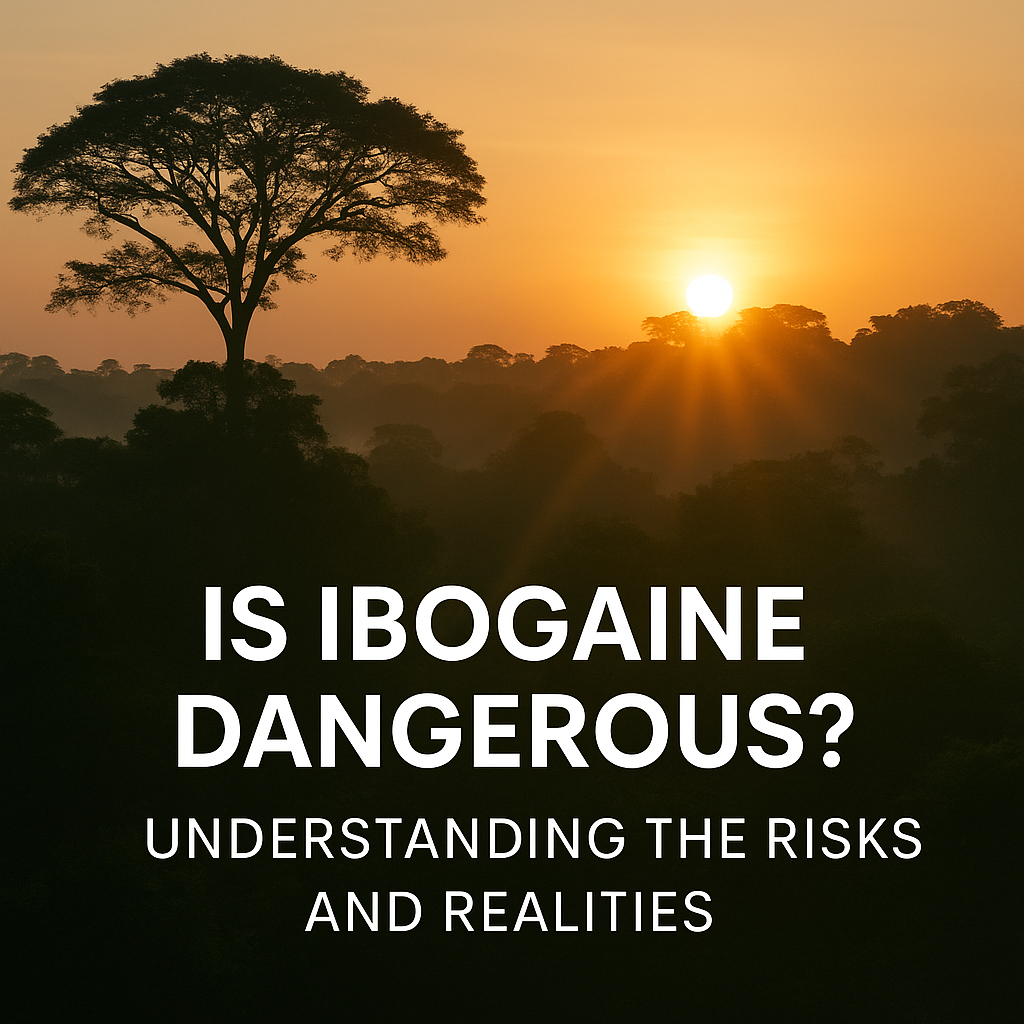Here’s a complete, well-balanced article you can use or adapt for Bwiti House or educational content, clear, factual, and aligned with professional retreat communication standards:
Is Ibogaine Dangerous? Understanding the Risks and Realities
In recent years, Ibogaine has gained attention as one of the most powerful plant-derived substances used for deep healing and addiction interruption. Originating from the Iboga root bark, a sacred plant used for centuries in the Bwiti tradition of Gabon, Central Africa, Ibogaine is known for its ability to induce profound introspection, emotional cleansing, and even neurochemical reset.
But with its increasing visibility, a common and important question arises:
Is Ibogaine dangerous?
1. Understanding Ibogaine and Its Effects
Ibogaine is a naturally occurring alkaloid found in the Tabernanthe iboga shrub. In traditional Bwiti ceremonies, it’s used as a spiritual sacrament, a tool for self-discovery, initiation, and healing under the guidance of experienced elders.
In modern clinical or therapeutic contexts, Ibogaine has shown remarkable results for interrupting substance dependencies, particularly opioids, alcohol, and stimulants. However, it is a powerful neuroactive substance that affects the heart, nervous system, and liver, and therefore requires careful medical and spiritual supervision.
2. Why Ibogaine Can Be Dangerous Without Proper Guidance
While Ibogaine itself is not inherently toxic in small, controlled doses, its misuse or poor administration can be life-threatening.
The risks primarily arise from:
- Cardiac complications:
- Ibogaine can prolong the QT interval, an electrical rhythm of the heart. If not monitored, this can lead to arrhythmia or cardiac arrest in vulnerable individuals.
- Liver strain:
- Since Ibogaine is metabolized in the liver, those with liver dysfunction or certain medications (like SSRIs or opiates) face increased risk.
- Improper dosing or setting:
- High doses administered outside medical supervision, or without pre-screening, have led to reported fatalities — almost always in unsupervised, non-traditional, or underground settings.
- Lack of integration or support:
- The psycho-spiritual intensity of the experience can be destabilizing without adequate preparation or follow-up integration.
In short: Ibogaine is not a recreational or “do-it-yourself” plant. It is sacred medicine that must be treated as such.
3. The Traditional Bwiti Context: Safety Through Ceremony
Within the Missoko Bwiti tradition, Iboga is never taken casually. Ceremonies are conducted by trained initiates under the authority of a Bwiti Master such as Moughenda Mikala, with generations of knowledge about dosage, preparation, and spiritual protection.
Participants are medically screened, spiritually prepared, and supported throughout the process by experienced providers, musicians, and healers.
This traditional framework — balancing the physical, emotional, and spiritual dimensions, has allowed the Bwiti people to work safely with Iboga for hundreds of years.
4. Modern Medical Safety Protocols
At reputable centers, Ibogaine-assisted retreats or initiations follow strict safety measures:
- Comprehensive health assessments (ECG, liver panel, blood pressure).
- Medication and substance detox period before arrival.
- Medical and emergency equipment on site.
- Continuous supervision during and after the ceremony.
- Gradual integration to help participants make sense of their insights and maintain stability after returning home.
When conducted under these conditions, the risk of complications is extremely low, and the potential for transformation, physical, psychological, and spiritual is immense.
5. The Real Risk: Disrespecting the Medicine
Most of the tragedies linked to Ibogaine stem from one cause, lack of respect for its power.
When used without lineage, medical oversight, or ethical guidance, even a sacred medicine can become dangerous.
But when honored as part of a living tradition, Iboga becomes a teacher, a mirror, and a catalyst for profound healing.
Conclusion
So, is Ibogaine dangerous?
It can be , in the wrong hands.
But in the right environment, under proper medical screening, expert supervision, and authentic Bwiti guidance, Ibogaine can be one of the most deeply transformative and healing tools known to humankind.
At Bwiti House, safety, lineage, and integrity come first. Each participant is guided with respect for both modern science and ancient wisdom, ensuring that the medicine is experienced not as a risk, but as a sacred path toward renewal.











